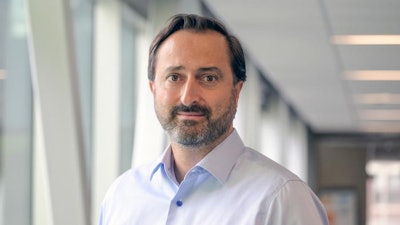
Scientists at Université de Montréal’s affiliated hospital research centre (CRCHUM) are testing out a mobile application to help young adults who have a first episode of psychosis to support safer cannabis consumption.
The nationwide clinical trial, a first in Canada, is led by Université de Montréal psychiatry and addictology professor Didier Jutras-Aswad, a researcher at CRCHUM.
Called CHAMPS (Cannabis Harm-reducing App to Manage Practices Safely), the pilot study is described in an article published in the August issue of Psychiatry Research.
The new study is backed by $800,000 in funding from the Canadian Institutes of Health Research (CIHR), specifically to evaluate the efficacy of the app.
“Built in collaboration with young adults, clinicians and a number of experts, our app includes interactive modules and personalized support to reduce risks associated with cannabis consumption,” said Jutras-Aswad, head of the CHUM’s Department of Psychiatry.
“Our pilot study confirmed its acceptability among youth having experienced a first psychotic episode,” he said. “The funding from the CIHR will allow us to further document the app’s uses in diverse clinical contexts.”
A multidisciplinary team
The pilot study was conducted with the support of a multidisciplinary team that included Stephanie Coronado-Montoya, the study’s first author and former PhD student of Jutras-Aswad’s, and Dr. Amal Abdel-Baki, a psychiatrist at CHUM, among others.
In all, 101 young adults, ranging from 18 to 35 years old, were monitored in six specialized early-intervention clinics for psychosis in Quebec and Nova Scotia.
The goal of the project is to provide an alternative to traditional care centered on abstinence and which is often inadequate for young adults who have experienced a first episode of psychosis and who do not plan to stop their cannabis consumption.
“When comparing standard care to an approach that includes CHAMPS, we can see that the app is well regarded and that it can be integrated into real clinical environments,” said Jutras-Aswad.
“Even if we cannot currently draw any conclusions about CHAMPS’s efficacy, we have seen an encouraging signal in terms of a decrease in cannabis-related problems,” he said.
Now he and his researcher team aim to expand their work to include 250 young adults and six clinics throughout Quebec, Nova Scotia and Alberta. Recruitment will take place over a three-year period.
Could support clinicians, too
CHAMPS is more than a phone app, its proponents say: it could easily be included in existing clinical care, without increasing workloads for medical personnel.
In fact, the researchers add, it exemplifies a new approach to mental health care, one that is specifically designed to meet the actual needs of an often neglected young adult population.
“Many people don’t seek to, at least for a certain period of time, reduce or cease their cannabis use,” said Jutras-Aswad. “But these young people are open to changing their consumption to reduce the risks to their health. This is what CHAMPS is for.”
Designed in Montreal, the app could be adopted in countries where cannabis consumption is still illegal, he added. CHAMPS joins a larger movement that is working toward humanizing, personalizing and de-stigmatizing cannabis use in mental health care, he said.
“It’s very important that we change perceptions, practices and philosophies in order to more broadly adopt harm reduction in mental health care,” he emphasized.
To that end, in July, he and his team published several Recommendations for Reducing the Risk of Cannabis Use-Related Adverse Psychosis Outcomes, actively promoting their approach via an international group.






















